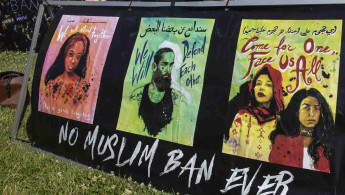Iranian-Americans sue Trump administration over 'Muslim travel ban'
The families sued on Monday in a federal court in Santa Ana, California, saying they had waited months for visa waivers to be able to be reunited, but the US government hasn't issued them, the Associated Press reported.
They fear that escalating tensions between the US and Iran will mean they will be separated indefinitely.
"They don't have any other options, and so the only hope they have is the court. Otherwise, they could be in this indefinitely," said Curtis Morrison, one of the plaintiffs' lawyers.
The travel ban, which affects citizens of Iran, Libya, Somalia, Syria, Yemen and North Korea, was first introduced in 2017. In the wake of several attempts to block the executive order in courts across the nation, the ban was finally upheld by the Supreme Court last year.
The ban also applies to government representatives from Venezuela.
The group of 14 Iranian-American families joins families in California and New York to have sued the Trump administration over its failure to grant visa waivers it said would be available.
The ban allows for waives to be granted on an individual basis so long as issuing them does not threaten national security.
But advocates point to the fact there is no formal system to apply, and few waivers have been issued - just six percent of applicants have been granted permission to travel to the US, according to Reuters.
Morrison filed a federal lawsuit earlier this year on behalf of seven families trying to bring their relatives from Yemen. All have since been approved.
The lawyers said he often receives frantic calls from the Iranian-American plaintiffs in this case who worry that rising tensions between Washington and Tehran will impact their chances of reunification.
Farzan Nematollah, a US citizen living in Southern California, worries about how he will care for his Iranian wife in the future and wants the US government to move quickly on a waiver so the couple can start a family, the lawsuit said.
Shamim Darchini, a US citizen due to start a graduate program in San Diego, has been married to her Iranian husband for four years.
He was interviewed by a consular officer two years ago, but the couple have been waiting for further news since then.
Darchini visits him on holiday, but says the prolonged separation has left her sleepless and stressed. Attempts to apply pressure via social media and local representatives have made no headway.
"It is a nightmare," she said. "I really don't know what I have to do."
Follow us on Twitter: @The_NewArab





 Follow the Middle East's top stories in English at The New Arab on Google News
Follow the Middle East's top stories in English at The New Arab on Google News


